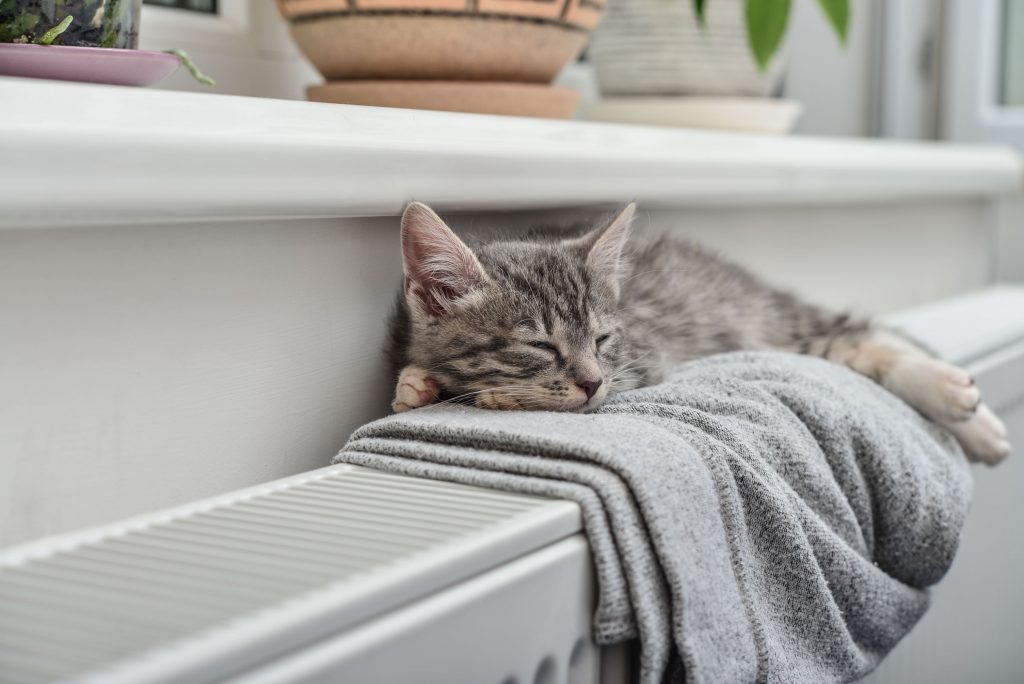
Should You Worry About Cat Safety During Winter?

Cats are fully equipped to handle weather extremes, but they aren’t invincible to severe exposure. Their thick fur coats add layers of comfort, but what about the thin skin around their ear tips, those cute little paws, or that adorable triangular nose? It is critical to elevate cat safety during winter months in order to maintain overall good health.
Slowing Down, Not Stopping
As the days grow shorter and much colder, a natural inclination might be to simply hunker down and limit activities previously enjoyed weeks earlier. Life must go on despite uncomfortable temperatures, and pets undoubtedly benefit from keeping their routines in tact. Meal times, exercise times, and sleeping schedules may vary between seasons, but attempts to manage them can support overall wellness. Beat the winter blues by providing new, interesting toys and games.
Let Me Out!
If your cat is accustomed to popping outside throughout the day, they may still want to even when it’s cold. Depending on the outside temperature and ground conditions, not to mention your cat’s overall tolerance, they may keep their visits outside to a minimum. Always watch them closely during these times, and call them back after 15 minutes. Do not allow your cat outside when temperatures are below freezing.
Hiding
Cats may seek refuge in odd places if or when they feel cold. You might be surprised to find your cat in any number of locations, including beneath the car hood, under the deck, in wood piles, or any other makeshift shelter.
Stray or feral cats may decide to stick around your property if you provide bins with self-warming blankets or bedding, food, and heated water. Mitigating interactions between homeless cats and your pets should only be done with caution. Updating vaccinations and year-round parasite prevention medication are vital parts of your cat’s defense.
The Air All Around
Before leaving home, check the thermostat to ensure that your cat will stay warm and comfortable in your absence. Space heaters can be hazardous to cat safety during winter if accidentally tipped over while you’re not home.
Fireplaces may also present certain risks to cat safety during winter. Screen the hearth, keep candles on inaccessible surfaces, and check your home’s smoke detectors.
Be sure they have thick blankets or bedding to curl up on away from drafts, especially if your cat is older and arthritic.
Cat Safety During Winter
Some ice melt products can be hazardous to your cat’s health. Check that the de-icer or salt mix is considered safe to use around animals. When your cat comes in from outside, wipe their paws off with warm water and dry thoroughly to reduce cracking or exposure to chemicals.
Be sure that regular grooming continues throughout the winter. Your cat’s skin will thank you for it! If you do happen to notice dandruff, or flaky skin, please let us know.
Before You Know It
Warmer days will be here before you know it, but supporting cat safety during winter is an incredible example of responsible ownership. If you have any questions, our staff is always happy to help at (703) 920-5300. From all of us at Arlington Animal Hospital, have a safe and happy winter!
Contact Us!
2301 Columbia Pike #G-1, Arlington, VA 22204
Phone: (703) 920-5300
Fax: (703) 685-8860
Email: info@myarlingtonvet.com
Office Hours
-
Monday
8 a.m. – 8 p.m.
-
Tuesday
8 a.m. – 8 p.m.
-
Wednesday
8 a.m. – 6 p.m.
-
Thursday
8 a.m. – 6 p.m.
-
Friday
8 a.m. – 6 p.m.
-
Saturday
8 a.m. – 2 p.m.
-
Sunday
CLOSED
- Doctors’ hours are by appointment only.



